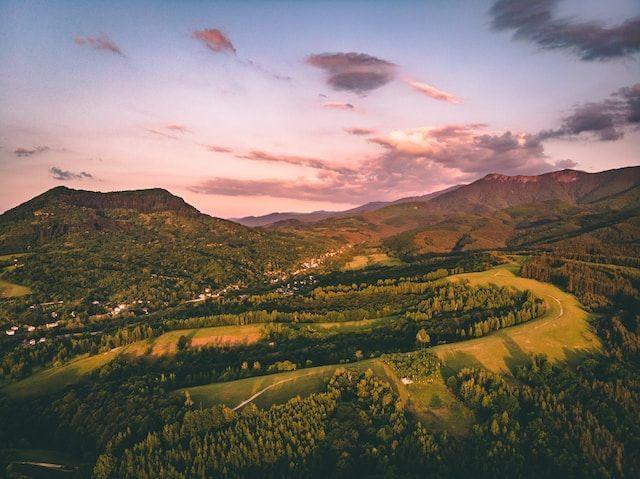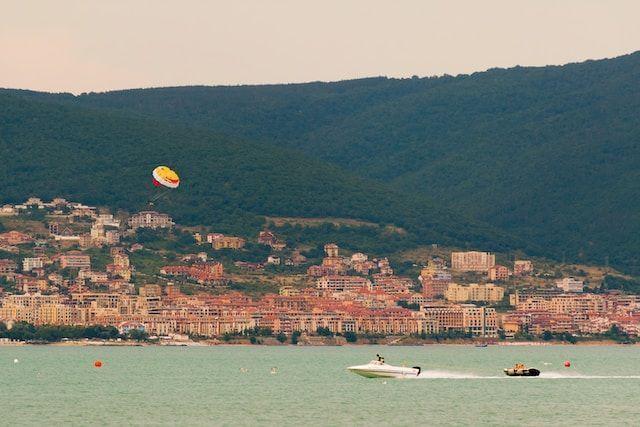Bulgaria Travel Guide: Notes to Explore Bulgaria
Bulgaria offers visitors a unique combination of natural beauty, history, culture, and archaeological sites. In this Bulgaria travel guide you will find the necessary information to plan your trip.
General Information of Bulgaria
Bulgaria is a country located in Southeastern Europe. Its capital and largest city is Sofia. Bulgaria is bordered by Romania to the north, Serbia and North Macedonia to the west, Greece and Turkey to the south, and the Black Sea to the east.
The country is known for its beautiful natural scenery, including the Black Sea coast, the Balkan Mountains, and the Danube River. It also has a rich history, with numerous archaeological sites and historic monuments.
Some of the most popular tourist destinations in Bulgaria include Sofia, Plovdiv, Varna, and the ski resort of Bansko.
Bulgaria has a population of around 6.9 million people, and its official language is Bulgarian. The country has a rich cultural heritage, with influences from Slavic, Byzantine, and Ottoman traditions.
The nation is a parliamentary democracy with a president as head of state and a prime minister as head of government. The country joined the European Union in 2007 and is also a member of NATO.
The economy of Bulgaria is primarily based on services, industry, and agriculture. Major industries in the country include mining, metallurgy, energy, and tourism. The currency used in Bulgaria is the Bulgarian lev.

Montañas y colinas con vegetación durante el día
Picture of Hristo Sahatchiev on Unsplash
Location of Bulgaria
Below, we show you where Bulgaria is located:
Map of Bulgaria on Google Maps
Top 5 Places to Visit in Bulgaria
Bulgaria is home to a wealth of historical, cultural, and natural attractions. Here are just a few examples of the many fascinating and beautiful sites of interest if you're wondering what to explore in Bulgaria.
Sofia
The capital city of Bulgaria, Sofia, is home to many historic landmarks and museums. Some of the top attractions include the Alexander Nevsky Cathedral, National Palace of Culture, and the Museum of Socialist Art. Visitors can also enjoy shopping at the Vitosha Boulevard, and explore the city’s vibrant nightlife.
Plovdiv
Plovdiv is the second-largest city in Bulgaria and one of the oldest cities in Europe. The city is known for its well-preserved Roman amphitheater, Ancient Theater, and numerous museums. Visitors can also explore the Old Town of Plovdiv, with its narrow streets, colorful houses, and charming cafes.
Rila Monastery
Located in the Rila Mountains, the Rila Monastery is one of Bulgaria’s most famous landmarks.
Founded in the 10th century, the monastery is a UNESCO World Heritage site and is known for its stunning frescoes and unique architecture. Visitors can explore the monastery’s many churches, museums, and gardens.
Nessebar
Nessebar is a small town on the Black Sea coast, known for its well-preserved medieval architecture and ancient ruins. Visitors can explore the town’s many churches and historic buildings, as well as enjoy the beach and local seafood.
Bansko
Bansko is a popular ski resort town in the Pirin Mountains. The town is known for its traditional architecture, vibrant nightlife, and excellent skiing opportunities. Visitors can also explore the nearby hiking trails and thermal springs.
What to Eat and Drink in Bulgaria
If you are a lover of food, you will love to discover Bulgaria through its flavors. Bulgarian cuisine is influenced by its rich history and geography, and is characterized by its use of fresh and locally sourced ingredients.
Popular dishes often include a variety of grilled meats, stews, and savory pastries. Bulgarian cuisine also features a wide range of fresh salads, often made with locally grown vegetables and herbs.
When it comes to drinks, Bulgaria is known for its wine and rakia, a fruit brandy that is often served as an aperitif. In addition, Bulgarian beer is also popular, with several local breweries producing a range of lagers and ales.
Other popular beverages include ayran, a refreshing yogurt drink, and boza, a sweet and tangy fermented drink made from grains.
How Is the Culture in Bulgaria?
Bulgarian culture is a blend of traditions and customs that have been shaped by its rich history and diverse ethnic groups. Family and community are highly valued in Bulgarian culture, and hospitality plays an important role in social interactions.
Music and dance are also an integral part of Bulgarian culture, with traditional folk music and dance still popular today. Crafts and artisanal traditions, such as pottery and embroidery, also play an important role in Bulgarian culture, with many artisans passing down their skills from generation to generation.
Religion is also an important part of Bulgarian culture, with the majority of the population belonging to the Eastern Orthodox Church. Bulgarian Orthodox religious traditions are deeply ingrained in the country’s customs and celebrations, from weddings and baptisms to Easter and Christmas.
In addition, Bulgarian culture places a strong emphasis on education and intellectual pursuits, with many famous Bulgarian writers, artists, and scientists contributing to the country’s cultural legacy.
Overall, Bulgarian culture is a vibrant and diverse tapestry that reflects the country’s unique history and traditions.
How to Get to Bulgaria
Bulgaria can be reached by air, land, or sea. The main international airport is Sofia Airport, which is located in the capital city of Sofia. Other airports in Bulgaria include Varna Airport, Burgas Airport and Plovdiv Airport.
There are also several international train routes that connect Bulgaria to neighboring countries, including Romania, Greece, and Turkey.
Bus and car travel are also popular options for traveling to Bulgaria, with several international bus companies operating routes to major Bulgarian cities.
If traveling by sea, there are several ferry routes that connect Bulgaria to neighboring countries along the Black Sea coast, including Romania, Ukraine, and Turkey.
It’s important to check the entry requirements for Bulgaria, as they may vary depending on your country of origin and the purpose of your visit. Some countries may require a visa, while others may only need a valid passport or a national ID card.
How to Get Around Bulgaria?
Bulgaria has a well-developed transportation network, making it easy to get around the country. Bellow we tell you some options for transportation in Bulgaria
Public transportation
Bulgaria has an extensive public transportation system, including buses, trams, trolleys, and metros in major cities such as Sofia, Plovdiv, and Varna. Public transportation is usually affordable and reliable, and tickets can be purchased at kiosks or directly from the driver.
Taxis
Taxis are a popular and convenient mode of transportation in Bulgaria. They are easily found in major cities, and fares are usually metered. It’s recommended to only use licensed taxis and to confirm the fare before starting the ride.
Car Rental
Car rental is a good option for those who want to explore Bulgaria’s rural areas and natural attractions. Major international car rental companies have offices in Bulgaria, and rental rates are usually reasonable.
Train
Bulgaria has an extensive rail network, connecting major cities and towns throughout the country. Train travel can be comfortable and affordable, and tickets can be purchased at train stations or online.
Domestic Flights
For longer distances, domestic flights are available to major cities such as Sofia, Varna, and Burgas. Bulgarian airlines offer frequent flights at reasonable prices, making it a good option for those who want to save time.
Best Time to Visit Bulgaria
The best time to visit Bulgaria largely depends on your interests and what you want to do during your trip.
Generally, the peak tourist season in Bulgaria is during the summer months of June to August, when the weather is warm and sunny. During this time, popular coastal resorts such as Sunny Beach and Golden Sands are bustling with tourists enjoying the beaches and nightlife.
If you’re interested in winter sports, then the best time to visit Bulgaria is during the winter months of December to March. Bulgaria has several ski resorts, such as Bansko, Borovets, and Pamporovo, which offer excellent skiing and snowboarding opportunities.
For those interested in cultural and historical attractions, the best time to visit Bulgaria is during the shoulder seasons of April to May or September to October.
The weather during those months is mild and pleasant, and tourist crowds are generally smaller, making it easier to explore popular sites such as the Rila Monastery, the ancient city of Plovdiv, and the capital city of Sofia.
It’s worth noting that weather in Bulgaria can be unpredictable, with sudden rain or heat waves occurring during any season. However, overall, the best time to visit Bulgaria depends on your interests and what you want to do during your trip.
Beaches of Bulgaria
Bulgaria has a long stretch of coastline along the Black Sea, offering many beautiful beaches for visitors to enjoy. Here are some of the best beaches in Bulgaria:
Sunny Beach
Sunny Beach is one of the largest and most popular beach resorts in Bulgaria. The long stretch of golden sand beach is perfect for sunbathing, swimming, and watersports. The beach is lined with bars, restaurants, and clubs, making it a great destination for those looking for a lively atmosphere.
Golden Sands
Golden Sands is another popular beach resort, known for its long, wide beach and crystal-clear waters. The beach is surrounded by a nature park, offering beautiful views of the forested hills behind the beach. Golden Sands is also home to many luxury hotels, spas, and casinos.
Albena
Albena is a quieter beach resort, perfect for families and those looking for a more relaxed atmosphere. The beach is wide and sandy, with shallow waters that are safe for children to swim in. The resort also has many family-friendly activities, such as mini-golf and water parks.
Nessebar
Nessebar is a historic town located on a peninsula in the Black Sea. The town is known for its beautiful beaches, as well as its well-preserved ancient architecture. Visitors can enjoy a day at the beach and then explore the town’s narrow streets, ancient ruins, and historic churches.

Playa, ciudad y colinas de Nessebar, Bulgaria
Picture of Deny Hill on Unsplash
Is It Worth Visiting Bulgaria?
Of course! Bulgaria stands out for its incredible landscapes and its fascinating culture. In addition, the region is known for having amazing beaches for a wonderful holiday in the sun.
In turn, due to its proximity to Greece and Turkey, many travelers combine their trip to Bulgaria with these destinations, which is why you will find these sites in several of our offers.
Are you looking to marvel at the most incredible landscapes? Do you want to know a fascinating culture? Do you want to visit historical sites?
If your answer is "yes", at Greca we have several proposals for tourist packages to Bulgaria, which you can modify and adapt according to your needs and times.
There are travel packages for all tastes. Choose your own adventure according to your needs!
More Travel Guides!
If you have been interested in our travel guide to Bulgaria and you want to continue learning about this and other wonderful destinations, we invite you to look at the section of all our Travel Guides. Plan your next adventure with Greca!